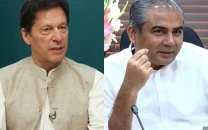PhD students cannot find willing mentors
Supervisors tell students they will have to stop teaching them unless the HEC budget crisis is resolved.

PhD students cannot find willing mentors
The HEC funds 4,000 scholars in MPhil/MS leading to PhD programmemes at universities abroad, and 5,000 scholars at universities in Pakistan. But the government has slashed its budgets for 2009-10 and 2010-11, leaving the commission struggling to find funding for its students.
Malik Waqar, who was awarded an HEC scholarship to do a PhD in law, said he had not received any money from the commission since he started his studies in 2008. He has completed his MPhil and started the PhD, but been told by his university that unless HEC funding comes through, he may have to quit without completing his degree.
For the first two years during their MPhil/MS programme, the HEC grants scholars Rs10,000 per month as stipend, Rs240,000 for tuition fees, and Rs10,000 for books. For the three years they are in PhD programmes, scholars get Rs13,000 each month and their supervisors gets Rs5,000 per student per month.
Dr Nawaz Chaudhry, an HEC-approved supervisor in earth sciences at Punjab University, told The Express Tribune that the HEC had stopped paying teachers their monthly honorarium and instead started paying them on the basis of ‘student performance’. He said each HEC-approved supervisor could guide a maximum of 8 PhD students at a time.
He said the HEC had started to pay honoraria only partially to supervisors in 2008 and this was “the first stage of HEC’s collapse”. He said that the scholars who started their studies in 2008 had not received any grants from the HEC.
Shahid Hussain, who began his PhD programme in languages at Bahauddin Zakria University in 2004, said he had encountered reluctant teachers before.
When he approached HEC-sanctioned supervisors in 2008, most of them rejected him because they were not receiving their honoraria from the HEC. He said that he had been turned down by a supervisor in September for the same reason.
Muhammad Asif, who began his programme in education at Punjab University in 2006, said he was thinking about going back to his old job.
“I used to run a small general store in Lahore before I began my post-graduate studies. I’m thinking of returning to it because I can’t even handle my own expenses, let alone the cost of research for my degree,” he said.
HEC spokesman Dr Mukhtar told The Express Tribune that he was hopeful that a six-member committee set up by the finance minister would resolve the funding and related issues.
The committee consists of the deputy chairman of the Planning Commission, federal education secretary, HEC chairman and three vice-chancellors of public universities.
Financial crunch
HEC executive director Prof Sohail H Naqvi briefed the finance minister on the commission’s budget woes on September 15.
According to the briefing, the HEC’s development budget for fiscal 2010-2011 is Rs15.762 billion, down from Rs22.500 billion in 2009-10. But the government released only half the 2009-10 budget. Under the original budgets, the government was supposed to release a total Rs19.5 billion to the HEC over the three quarters from January 1, 2010, to September 15, 2010, but actually released just Rs4.418 billion. The HEC immediately needs Rs5 billion to pay for rollover default from 2009-2010; Rs4.3 billion to finish projects which are 80 to 90 percent complete; and Rs7 billion to keep up scholarship payments to students. The HEC’s funding comes to about 0.23 percent of GDP in 2010-2011.
Published in The Express Tribune, September 22nd, 2010.


















COMMENTS
Comments are moderated and generally will be posted if they are on-topic and not abusive.
For more information, please see our Comments FAQ